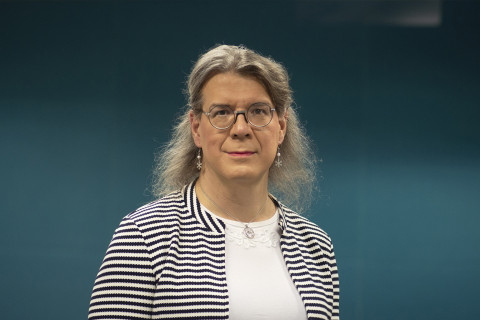“Ecosystem modelling is a highly topical field of science. Modern forest management requires that several forest ecology issues be considered at once,” Professor Annamari (Ari) Laurén says.
“The feedback loops of terrestrial biogeochemistry are much more complex than thought. Ecosystem modelling is used to mathematically analyse the links between these processes.”
With modelling, it is possible to examine, for example, the impacts of different forest management practices on the ecosystems and ecosystem services, such as wood production, climate change mitigation, and water protection.
“The goal to produce several ecosystem services simultaneously has fundamentally changed forest management, and this calls for robust mathematical tools.”
Towards precision forest management
In recent years, Laurén has published several ecosystem models. One of them is the Peatland Simulator, which models the biogeochemical core of peatland forests. Among other things, the Peatland Simulator can calculate timber growth, nutrient exports to water courses, organic matter decomposition, carbon balance and, for example, optimal forest management practices.
“The simulator can be used, for example, to determine the impact of ash fertilisation, and whether that could be used to replace ditch network maintenance. Or how methods of continuous cover forestry, such as selective felling or strip felling, affect the ecosystem and various ecosystem services,” Laurén explains.
“A lot of hope is put in continuous cover forestry, but calculations provide a more intellectual approach to the issue.”
Laurén wrote her doctoral dissertation in the field of forest soil science.
“I became interested in the soil as a system of its own. For a couple of years, I worked as a researcher in Indonesia at Stora Enso’s pulp plantations, then in the field of geoenvironmental engineering at the University of Oulu, as well as in the field of water protection research in what was known as the Finnish Forest Research Institute, Metla, at the time. After that, I went back to Indonesia, where I worked as a senior expert developing a nutrient balance model for plantation forests to support decision-making.”
“Today, we have access to very accurate GIS data on forests, trees, the soil, and drainage of ditches. These location-bound data and the use of ecosystem models will lead to precision forest management: the days of old thumb rules in forest management are gone.”
“We must have simulation tools that bring remote sensing data to life. Forest management has become rocket science, so to speak. Finland should be carbon neutral by 2035, and forest management especially on peatlands plays an important role. Well managed forests are carbon sinks, while poorly managed forests produce carbon emissions.”
The forest sector is suitable for those with a scientifically curious mind
According to Laurén, Finland has around 4,000–6,000 forestry professionals who give guidance on how forests should be managed. However, forest management affects – directly or indirectly – as many as one million Finns, who should be kept in the loop about what research tells us.
“No one can know everything, but everyone should know more,” she says.
“We have a duty to make information available. This requires not only research and pedagogy, but also commitment to lifelong learning: tweets or elevator pitches are not enough.”
“Issues relating to the environment and forest management will not be resolved by relying on luck. Forest sciences is now dealing with increasingly complex and challenging issues. This is why the sector is best suited for those with a scientifically curious mind.”
For further information, please contact:
Annamari (Ari) Laurén, tel. +358 50 452 4685, [email protected]
Print-quality photos available at: photo1 and photo2
***
Annamari (Ari) Laurén appointed as Professor of Process-based Forest Ecosystem Modelling at the University of Eastern Finland, 1 Jan 2022–
Doctor of Agriculture and Forestry, University of Joensuu, 1999
Master of Agriculture and Forestry, University of Joensuu, 1993
Title of Docent in Forest Soil Science, University of Eastern Finland, 2007
Key roles
Associate Professor (tenure track), Forest Ecosystem Modelling, University of Eastern Finland, 2018–2022






